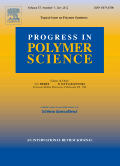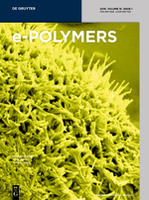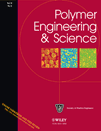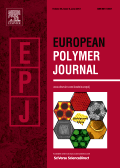
Polymers
Scope & Guideline
Exploring the forefront of materials innovation.
Introduction
Aims and Scopes
- Synthesis and Characterization of Polymers:
Research focused on developing new polymerization techniques, including the use of biopolymers and sustainable practices, and the characterization of polymers using advanced techniques. - Polymer Composites and Nanocomposites:
Investigation into the integration of nanomaterials and natural fibers into polymer matrices to enhance mechanical, thermal, and electrical properties. - Biodegradable and Eco-friendly Polymers:
Exploration of biodegradable polymers and their applications in sustainable packaging, biomedical applications, and environmental remediation. - Polymer Processing Techniques:
Studies on various polymer processing methods such as 3D printing, electrospinning, and injection molding, focusing on optimizing parameters for improved material performance. - Functional Polymers for Biomedical Applications:
Research into polymers designed for medical use, including drug delivery systems, tissue engineering scaffolds, and biocompatible materials. - Applications in Environmental Science:
Exploration of polymers in wastewater treatment, pollution control, and as materials for energy storage and conversion technologies. - Smart and Responsive Polymers:
Development of polymers with stimuli-responsive properties for applications in sensors, actuators, and other advanced materials.
Trending and Emerging
- Sustainable and Bio-Based Polymers:
Increasing focus on polymers derived from renewable resources and those designed to be biodegradable, aligning with global sustainability goals. - Advanced 3D Printing Techniques:
Emerging research in additive manufacturing highlights innovative methods and materials, such as biopolymers and composite filaments, enhancing the functionality and application of 3D-printed structures. - Smart Polymers and Responsive Materials:
Growing interest in polymers that change properties in response to environmental stimuli, paving the way for applications in sensors, drug delivery systems, and soft robotics. - Nanotechnology in Polymer Science:
Exploration of nanocomposites and the incorporation of nanomaterials into polymers to significantly enhance their properties and functionalities. - Multifunctional Polymer Systems:
Research into polymer systems that serve multiple functions, such as antimicrobial properties, self-healing capabilities, and enhanced mechanical performance. - Integration of Machine Learning in Polymer Research:
Utilization of machine learning techniques to predict polymer behavior, optimize synthesis processes, and analyze material properties, reflecting the trend towards data-driven research. - Polymer-Based Energy Storage and Conversion:
Emerging studies focus on polymers used in batteries, supercapacitors, and fuel cells, highlighting their potential in enhancing energy efficiency and sustainability.
Declining or Waning
- Conventional Polymer Processing Techniques:
Research on traditional methods such as simple extrusion or molding without innovative adaptations is becoming less frequent as the field advances towards more sophisticated processing techniques. - Focus on Non-Biodegradable Plastics:
There is a noticeable decline in studies centered around non-biodegradable plastics, as the scientific community increasingly emphasizes sustainability and the development of biodegradable alternatives. - Basic Polymer Chemistry:
Research focusing solely on fundamental polymer chemistry without practical applications or advancements in technology is seeing reduced interest in favor of applied and interdisciplinary studies. - Single-Use Plastic Applications:
Studies related to single-use plastics are declining as the emphasis on sustainability and environmental impact grows, leading to a preference for reusable or biodegradable materials.
Similar Journals

JOURNAL OF POLYMER RESEARCH
Fostering Knowledge in Materials and Organic ChemistryJOURNAL OF POLYMER RESEARCH is a leading peer-reviewed journal published by SPRINGER, specializing in the dynamic fields of polymer science, materials chemistry, and organic chemistry. Operating since 1994, this esteemed journal has consistently delivered high-quality research articles that illuminate the latest advancements and innovations in polymer technology. With an increasing impact factor and placed in the Q2 category for both Materials Chemistry and Polymers and Plastics, it stands as a valuable resource for researchers, professionals, and students seeking cutting-edge knowledge in these areas. The journal is indexed in Scopus, highlighting its significance in the academic community, with notable rankings in Materials Science and Organic Chemistry. While it does not currently offer open access options, the meticulous selection of research and thorough peer-review process ensures each article's contribution to the field is both robust and impactful. Researchers aiming to expand their understanding and engage with pioneering studies will find JOURNAL OF POLYMER RESEARCH an indispensable platform.

PROGRESS IN POLYMER SCIENCE
Empowering Researchers with High-Impact FindingsPROGRESS IN POLYMER SCIENCE is a prestigious academic journal published by PERGAMON-ELSEVIER SCIENCE LTD, dedicated to advancing the field of polymer science. With an ISSN of 0079-6700 and an E-ISSN of 1873-1619, this journal has established itself as a leading source of high-quality research since its inception in 1967. It ranks in the top quartile (Q1) across multiple categories including Ceramics and Composites, Materials Chemistry, Organic Chemistry, Polymers and Plastics, and Surfaces and Interfaces, reflecting its strong reputation and impact within the scientific community. The journal features rigorous peer-reviewed articles that not only contribute to theoretical advancements but also emphasize practical applications of polymer science in various industries. Although it is not an open-access journal, it remains accessible through institutional subscriptions and provides invaluable insights and data for researchers, professionals, and students alike. PROGRESS IN POLYMER SCIENCE is essential reading for anyone looking to stay abreast of the latest developments and innovations in this dynamic field.

JOURNAL OF POLYMER SCIENCE
Transforming Ideas into Polymers: A Hub for Cutting-edge ResearchJOURNAL OF POLYMER SCIENCE, published by WILEY, is a premier, open-access journal dedicated to advancing the field of polymer science and its applications. With an ISSN of 2642-4150, it offers a platform for high-quality research and innovative ideas, contributing significantly to the understanding of polymaterials and their functionalities. The journal is recognized for its exceptional impact within various categories, consistently achieving Q1 rankings in Materials Chemistry, Physical and Theoretical Chemistry, and Polymers and Plastics, demonstrating its influential presence in the academic community. As of 2023, it holds a distinguished position in Scopus rankings, underscoring its relevance and rigorous peer-review process. By facilitating open access to vital research findings, the JOURNAL OF POLYMER SCIENCE plays a crucial role in fostering collaboration and knowledge transfer among researchers, professionals, and students, paving the way for innovative developments in polymer applications and materials science.

E-POLYMERS
Transforming Ideas into Solutions in Polymer ScienceE-Polymers, an esteemed journal published by De Gruyter Poland Sp. z o.o., serves as a vital platform for advancing knowledge in the fields of chemical engineering, polymer science, and theoretical chemistry. With its Open Access policy since 2019, researchers from around the globe can freely access and disseminate groundbreaking findings that span the convergence of diverse disciplines, making it an indispensable resource for both academia and industry. The journal is recognized for its significant impact, reflected in its Q2 ranking in Chemical Engineering, Physical and Theoretical Chemistry, and Polymers and Plastics categories in 2023. Its impressive Scopus rankings further solidify its position, showcasing a percentile rank of 70th and above across major categories. With a publication history extending from 2001 to 2024, E-Polymers continually addresses pressing challenges within the polymer research community, fostering innovation and collaboration among researchers, professionals, and students eager to contribute to the evolving landscape of materials science.

Journal of Macromolecular Science Part A-Pure and Applied Chemistry
Fostering Global Collaboration in Macromolecular ResearchWelcome to the Journal of Macromolecular Science Part A - Pure and Applied Chemistry, a distinguished publication dedicated to advancing the understanding of macromolecular science, encompassing critical areas such as polymers, materials chemistry, and composites. Published by Taylor & Francis Inc, this journal has firmly established its place within the scientific community, evident from its ranking in the Q2 and Q3 quartiles across various categories in the latest assessments, including Polymers and Plastics as well as Ceramics and Composites. With a commitment to providing high-quality peer-reviewed content, the journal aims to facilitate knowledge exchange and innovation among researchers and practitioners from around the globe. The absence of open access underscores the journal's commitment to maintaining rigorous editorial standards while remaining accessible to its readership. As the journal converges through valuable research contributions from 1992 to 2024, it continues to be a pivotal resource for professionals and students seeking to explore the latest advancements and applications in the field of macromolecular science.

POLYMER ENGINEERING AND SCIENCE
Transforming Ideas into Polymer SolutionsPOLYMER ENGINEERING AND SCIENCE, published by WILEY, is a premier journal specializing in the field of polymer science and engineering. Since its inception in 1961, this journal has been at the forefront of disseminating high-quality research, focusing on various aspects of polymers and plastics, including their chemistry, properties, and applications. With an impressive impact factor, it ranks in the second quartile (Q2) across multiple categories, including Chemistry (Miscellaneous), Materials Chemistry, and Polymers and Plastics, showcasing the journal's significance and influence in these vital areas of research. Researchers and professionals in academia and industry will find the latest advancements and innovative methodologies in polymer science, making this journal an essential resource for those looking to stay updated on cutting-edge developments. While it does not currently support Open Access, its comprehensive scope and critical insights positioned it as a valuable platform for advancing knowledge and fostering collaboration within the polymer community. The journal’s office is located at 111 River St, Hoboken 07030-5774, NJ, United States, emphasizing its strong presence in the academic landscape.

Polymer-Plastics Technology and Materials
Pioneering Research in Materials ChemistryPolymer-Plastics Technology and Materials is a premier academic journal published by Taylor & Francis Inc., dedicated to the dynamic fields of chemical engineering, materials chemistry, and polymers and plastics. With an impact factor that reinforces its reputation, this journal is strategically indexed in Scopus, ranked notably within its categories (Q2), showcasing its influence and relevance in the academic community. Since its inception in 2019, the journal has served as an essential platform for researchers, professionals, and students to disseminate innovative studies and advancements in polymer science and materials technology. As an Open Access publication, it ensures that cutting-edge research is accessible to a global audience, fostering collaboration and knowledge sharing in the material sciences. Located in the United Kingdom, Polymer-Plastics Technology and Materials continues to enhance the dialogue within the industry, addressing critical challenges and exploring emerging trends that shape the future of polymer and plastics technologies.

POLYMER BULLETIN
Fostering Collaboration in Interdisciplinary Polymer StudiesPOLYMER BULLETIN is a prominent journal in the field of polymer science, published by SPRINGER in Germany. Established in 1978, this peer-reviewed journal focuses on the latest research and developments in polymer chemistry, materials science, and condensed matter physics, boasting a commendable impact factor indicative of its rigorous academic standards. With a Q2 ranking in multiple categories including Chemistry (Miscellaneous), Condensed Matter Physics, Materials Chemistry, and Polymers and Plastics, POLYMER BULLETIN serves as an essential resource for researchers, professionals, and students aiming to stay abreast of innovative findings and methodologies within these interdisciplinary landscapes. Although the journal does not currently offer open access, it provides invaluable insights and data that significantly contribute to the advancement of polymer science. For more information and to access published articles, visit the journal's page on the Springer website.

EUROPEAN POLYMER JOURNAL
Exploring the Frontiers of Polymer ResearchEUROPEAN POLYMER JOURNAL is a leading academic journal published by PERGAMON-ELSEVIER SCIENCE LTD, dedicated to advancing the field of polymer science and engineering. With a distinguished history since 1965, this journal serves as a critical platform for researchers to disseminate high-quality research findings within a broad scope that encompasses materials chemistry, organic chemistry, and physics. The journal boasts an impressive Q1 category ranking in multiple fields, including Materials Chemistry, Organic Chemistry, and Polymers and Plastics, placing it in the top tier of academic journals worldwide. Its standing is further reinforced by its high citation metrics, with ranks such as #16 in Organic Chemistry and #20 in Polymers and Plastics, reflecting its significant contribution to the advancement of knowledge and innovation in these areas. Although currently not available as an open-access journal, it provides subscribers with in-depth studies, reviews, and insights relevant to both academia and industry. Researchers, professionals, and students alike will find invaluable information and emerging trends in polymer research, making the EUROPEAN POLYMER JOURNAL an essential resource for staying at the forefront of this dynamic and evolving field.

Polymer Reviews
Transforming insights into impactful solutions.Polymer Reviews, published by Taylor & Francis Inc, is an esteemed journal dedicated to the intricate and evolving field of polymer science. With its ISSN 1558-3724 and E-ISSN 1558-3716, the journal has established a significant presence among researchers and practitioners alike, evidenced by its impressive categorization in the Q1 quartiles across multiple disciplines, including Biomedical Engineering, Materials Chemistry, and Renewable Energy. Since its inception in 2006 and continuing through 2024, Polymer Reviews has consistently aimed to advance the knowledge base of polymer applications and innovations, providing a platform for comprehensive review articles that stimulate further research and inspire practical solutions. The journal, ranking within the top percentile across several Scopus categories, underscores its impact and relevance in a rapidly developing scientific landscape. Though not an open-access journal, it remains a vital resource for those invested in the future of materials science and engineering.